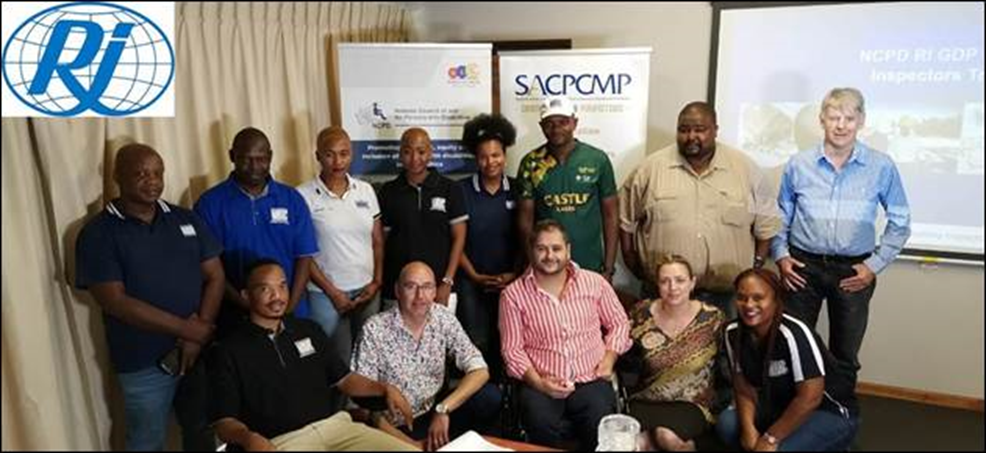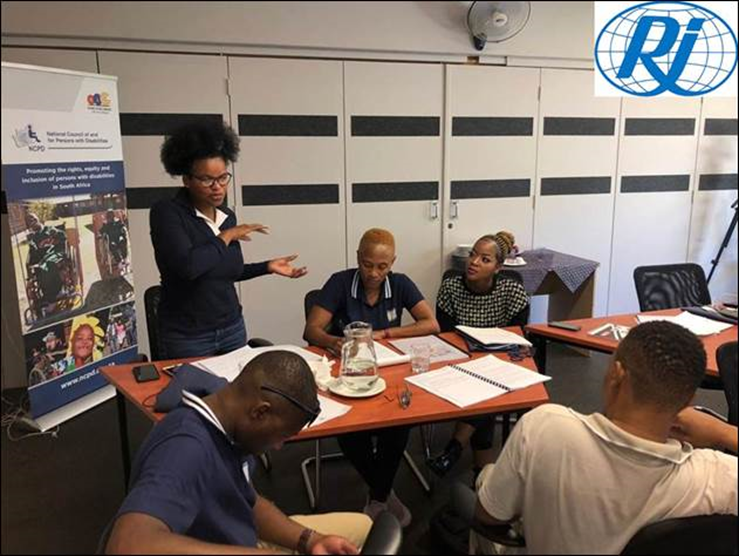The background and putting forward of this proposal were based on the following elements:
The results and findings of the NCPD with regard to the application and knowledge-set of building inspectors and associated personnel:
- The NCPD’s placement as the foremost specialists in Universal Accessibility and in ensuring equitable and transformative access to the built environment by Persons with Disabilities within South Africa and the associated expertise that NCPD has acquired;
- The conducting of similar training by the NCPD for a number of different other entities, along with NCPD’s track record of providing capacity building and institutional support in this area;
- Current work being undertaken by NCPD to create working SAQA modules for enforcement of instruments (such as Part-S of the National Building Regulations) in this space, and in creating SAQA modules for Universal Accessibility and Reasonable Accommodation around a number of different sectoral areas.
The NCPD has conducted two unpublished surveys regarding the knowledge, application, enforcement, and operationalization of Part-S of the National Building Regulations at the level of building plan approval processes at several of the major metropolitan municipalities nationally; the first of these took place in 2011 and the second survey was conducted in 2014. The findings of these surveys may be summarized as follows:
There is a gross lack of enforcement, starting with application perusals, regarding the provisions of Part-S of the National Building Regulations:
- There is a substantial misunderstanding regarding the enforceability and the applicability of Part-S, as well as a similar misunderstanding regarding the changes to Part-S of the NBR that were promulgated in 2011;
- A lack of knowledge regarding the application of Part-S, and a wider lack of knowledge regarding the policy environment around access regarding persons with disabilities and the built environment, specifically issues such as the Integrated National Disability Strategy, the Disability Rights Activity Machinery (DRAM) set up by National Department of Social Development, the United Nations Convention on the Rights of Persons with Disabilities, the Department of Public Works Technical Specifications on Environmental Accessibility and the applicable case law that has emerged;
- Organizational challenges regarding the responsible parties for checking and ensuring compliance with Part-S of the Building Regulations, with the general finding that, on the whole, Part-S is checked together with Part-T (Fire Regulations);
- Overall lack of oversight regarding ensuring backward and forward enforcement and ensuring compliance with Part-S of the Building Regulations;
- Other non-specific challenges faced by building inspectors and associated personnel regarding checking of plans, relating to issues such as lack of capacity, failure to upskill staff and so forth.

This has created a situation in which there is clearly a problem regarding the regulation of the National Building Regulations as pertains to Part-S. The timing of this proposal, however, relates to the recent approval of the White Paper on the Rights of Persons with Disabilities (WPRPD), and the establishment of sectoral Universal Accessibility Plans by Department of Social Development and the Presidency, which are now awaiting approval from the Office of the Presidency.
The content and application of the WPRPD, which has now been promulgated and is being affected, will ultimately substantially change, and empower the rights of Persons with Disabilities in South Africa,
and enforcement of Part-S will be more strictly regulated in future and will create a substantial burden on the part of building inspectorates to fulfil. Based on our findings and the current policy environment, this proposal seeks to address this in a pro-active manner to ensure that building inspectorates are already re-gearing when the more stringent and onerous regulatory environment comes into place.
NCPD has developed significant capacity in the last five years towards ensuring that is the main focal point for civil society activity in the field of environmental access for Persons with Disabilities and in the field of Universal Accessibility. We developed and finalized the training manual and Facilitators Guide that was a huge millstone in the South African context.

The feedback was overwhelming positive, and the Building Inspectors were grateful to have been part of the workshop. They left with new knowledge that they will implement and hopefully will be the start of a change in how Building Inspectors look at the SANS10400 Part S Building Standard. It is clear that the training is definitely necessary and relevant.
The Covid-19 pandemic had obviously stopped us to do the remote training sessions and the municipal, government staff does not get access to data and devices to do online training from home. We continued with the training in other ways to achieve our goals:
- Circulating the training material to building inspectors with telephone support from NCPD;
- Continue the training on a Webinar platform.
- Create online and media awareness to keep momentum.
This is an example of how we adjusted the in-person training to accommodate virtual training sessions that was attended by more than 80 persons per session:
The training of Building Inspectors will indeed be an ongoing program. Our future plan is to also reach trainee building inspectors and develop the appetite with Local Government, to enforce the approval of building plans/renovations, by a universally designed trained specialist Building Inspector, just like they enforce the approval by “green” experts and safety experts.


